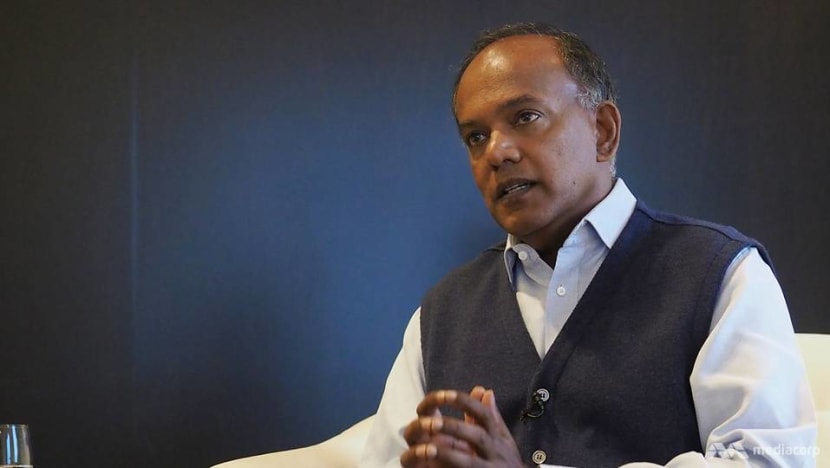‘It’s bunkum’: Shanmugam on pharma claims about cannabis for medical use
Government distinguishes between therapeutic products containing compounds from the plant, and “raw, unprocessed” cannabis, which has harmful effects.

Home Affairs and Law Minister K Shanmugam. (File photo: TODAY)
SINGAPORE: The trend towards accepting cannabis for medical use is driven by the “power of money and propaganda”, Law and Home Affairs Minister K Shanmugam told Channel NewsAsia as he charged pharmaceutical companies with hiding their intentions behind a smokescreen.
In December, Thailand became the first country in Southeast Asia – which has some of the world’s harshest penalties for drug-law violations – to legalise the use of cannabis for medical purposes. Malaysia and the Philippines have considered following suit.
Mr Shanmugam’s remarks came prior to a joint statement today by the Home Affairs and Health ministries, which set out the Singapore Government’s position on the use of pharmaceutical products containing cannabinoids – chemical compounds found in the cannabis plant.
The ministries made a distinction between such pharmaceutical products with potential therapeutic uses, and products containing unprocessed or raw cannabis – which, they affirmed, have harmful and addictive effects.
“To date, there are no studies which have validated the claims of unprocessed or raw cannabis being able to treat medical conditions,” they stated.
‘DEALING IN DESTRUCTION AND DEATH’
But pharmaceutical companies are pushing a different line for financial gain, Mr Shanmugam told the programme Insight, in an episode on the implications of Thailand’s legalisation of what some term medical cannabis.
“The research, in our view, is quite clear. The Institute of Mental Health (IMH) did a review of 500 articles between 1964 and 2015 on the effects of cannabis. It causes serious brain damage. One in two get addicted,” said Mr Shanmugam.
“The companies, which are interested in making money out of this – really dealing in destruction and death – have found a new way of arguing it.”
The papers reviewed had been published in medical journals and other literature by international medical bodies. The IMH research team concluded that “cannabis consumption is associated with irreversible brain damage, brain shrinkage and serious mental/psychiatric illnesses”, the statement read.
Some medicines, on the other hand, have cannabinoid products that are scientifically researched and medically approved. They can be administered through pharmaceutical products such as oral solutions and sprays.
There is published research, derived from clinical trials, on the potential uses of cannabinoids to manage seizures and epilepsy, cited the ministries.
Such cannabinoid pharmaceuticals must be reviewed by the Health Sciences Authority (HSA) before they can be registered for supply in Singapore.
“Manufacturers are required to substantiate the safety, quality and efficacy of the cannabinoid pharmaceuticals based on scientific evidence from clinical studies and data on the manufacturing process,” read the joint statement.
A CASE ‘FULL OF HOLES’
What companies have also done, however, is to take that concept, said Mr Shanmugam, “and they put a label – cannabis is good for you for medicinal purposes – and they spend a huge amount of money advertising it”.
“Some governments, quite frankly, then also look at the potential tax revenues. Though that’s a bum game, because I think in the states that have legalised, they find that the cost associated with increased health-related problems far outstrip any tax revenues,” he added.
The minister described the term “medical cannabis” as a way to “whitewash the whole subject”, and dismissed the case for legalising it as “full of holes” and illogical.
“If you want medical cannabis, what you’re really saying is certain cannabinoid compounds, which are already included in some medicines, which can be prescribed… So why do you need to go from there to consuming raw, unprocessed cannabis?” he questioned.
“For a medicinal purpose, if a doctor certifies the need for a certain type of medicine that has a cannabinoid compound, there’s no problem.”
There are strict frameworks in place for the supply, prescription and dispensing of controlled drugs used for medical purposes. Such drugs must be prescribed by a Singapore doctor for the medical condition registered with the HSA.
These are drug control policies underpinned by research, said the ministries, and the lack of scientific evidence of the safety and efficacy of raw cannabis use “supports our position that cannabis should remain an illicit drug”.
THE HIGH SOCIAL COST
The government will continue to allow “safe and controlled access to evidence-based medical treatment options”, while enforcing zero tolerance for illicit drugs because these can “destroy lives, families and communities”.
“Examples of other countries have clearly shown that a permissive attitude towards the use of drugs exacts a high cost on society,” the ministries added. “Singapore’s comprehensive and sustained approach to tackling both drug supply and demand has allowed us to remain relatively drug-free.”
The number of drug abusers arrested last year comprised less than 0.1 per cent of the population.
Many more people are kept protected by the strict laws against the trafficking, possession, consumption and import or export of illicit drugs, noted Mr Shanmugam. “They're innocent people, and a key component of the innocent people: Our children.”
Asked if a clearer distinction between support for medical and illegal drug use is needed, he replied that people would understand if it were explained, instead of being perverted to serve propaganda.
“The pharmaceutical companies can’t go out there and say: We want you to buy more drugs, and we want to make more money out of you,” he added.
“So they try and persuade you that they’re doing this to your benefit because it’s ‘medicinal’, you see. It‘s bunkum.”















